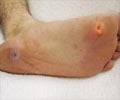Defining a patient's symptoms using the historical diagnostic labels of asthma and COPD is an outdated approach, suggested experts.

‘Defining a patient's symptoms using the historical diagnostic labels of asthma and chronic obstructive pulmonary disease is an outdated approach to understanding an individual's condition. Experts suggested a more personalized approach to management that identifies 'treatable traits' in each patient.’





In a perspective article, Professor Alvar Agusti and colleagues call for a new approach to patient management, which moves away from categorizing patients using the broad disease terms of asthma and COPD and towards a more personalized approach to management that identifies 'treatable traits' in each patient. In the past 30 years, new technologies have developed, providing clinicians with a range of tools to allow them to observe a patient and define that patient's condition. Previously, understanding a patient's condition relied on analysis of symptoms and signs, such as lung function measurements and airway hyper-responsiveness, but now clinicians can access information about a range of other underlying complex biological traits, including cellular and molecular traits. This could include measures such as CT scanning, cellular and molecular markers taken from blood samples, sputum and exhaled air and microbiome analysis.
Professor Agusti commented, "We propose a label-free precision medicine approach based on treatable traits that categorize the clinical and biological complexity of airway disease. The approach we are suggesting would radicalize healthcare and have significant implications for the organisation of a healthcare system. By recognizing the clinical and biological complexity of a disease, we can use causal mechanistic disease pathways to adopt a more precise approach, which is hopefully more effective at managing patients with these conditions."
In an accompanying editorial, Professor Peter Sterk, from the University of Amsterdam, supports the call for a move away from diagnostic labels. Professor Sterk commented, "We are living in an era where we have new biological knowledge and new targets for therapy but we largely continue to guide patient management with diagnostic labels. It is the right time for healthcare professionals to take bold steps and move aware from historical diagnoses that are impeding modern medicine."
Source-Eurekalert










